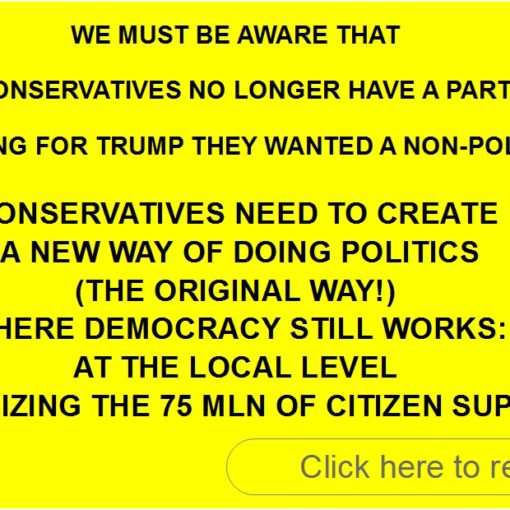- a.1 – ∙Reboot of Democracy (synopsis): How and why to change the contrast strategies of the Establishment of Politics
- I.a.2 – Reboot of Democracy: an alternative government to restore Democracy
- I.a.3 – How is it possible to restore Democracy (the need to abandon the current “opposition” to Social-Democracy policy)
- a.4 – The restoration of real democratic Politics
Summarizing what has been said in the previous articles, if you really want to bring Democracy back to its original dimension in which citizens are able to effectively meet their needs, it is necessary: <see my article “Towards a Democracy Reboot“>
(1)
stop to rely on activities of criticism or contrast,
which as mentioned above, however legitimate they may be, are destined not only to fail, but even to lead to a worsening of the situation [is illustrated in more detail in the next chapter “the need to abandon the mode “opposition” to Social Democratic policies”].
And abandoning this type of “dissident” activity means
(2)
starting to operate constructively
as illustrated in the following text.
<see “The need to start from a dimension of an effective democratic “power by the people“>
Premises to the definition of an effective change action
Upstream of everything, it is necessary to set the path of change taking into account the Principles that allow the System Democracy to function effectively:
1) human freedom, which entails, among other things, the accountability of citizens (remember that in the past, local communities have always managed themselves – even under empires – and have always developed a good quality of life).
2) the direct participation of citizens in decisions concerning the administration of the territory. Let us recall what has been said: satisfactory results are obtained only when the holders of the needs directly participate in the definition of solutions for their satisfaction.
3) objective information that reports the facts, and not, as happens today, a narrative of convenience: in order for citizens to participate in government decisions, they must be aware of the topics on which they decide. For this reason, a reboot of the information is necessary as illustrated in the next chapter.
4) a restoration of Culture: if information based on facts is essential in order to maintain the civic awareness of citizens, a culture capable of allowing the citizen to think for themselves is the fundamental pre-condition. For this reason, see below, it is necessary to recover a School with effective teachings.
The rules of change from an operational point of view
From an operational point of view, to develop an effective action to restore real democracy it is necessary:
■ find a way to bring citizens, from the moment, to participate directly in actions of “administration” of public affairs (Democracy “by the People”)
Since the action of change must be intrinsically democratic, it is necessary that initiatives are developed immediately that allow Citizens to develop constructive actions as an alternative to those undertaken by the institutions.
These can be initiatives related to local services and works, or actions such as the monitoring of the territory regarding things like pollution or the situation of public health. (see “Popular initiatives” below)
■ redefine Information strictly linked to reality
As illustrated above, for democratic government to function, citizens must be informed about how things stand in reality. <see my Article”An elementary (reassuring) approach of “dissident information“>
■ recovery of a culture (reboot of the Education system)
It should not be forgotten that the essence of the citizen’s civic awareness (basic quality of Democracy) is closely linked to the existence of a solid Culture. It is therefore necessary in the first place to recover the lost qualities of School education. <see my text “Participated School“>
Operationally speaking: the need to abandon “opposition” activities and to activate bottom-up initiatives
The need to abandon the critical approach to the System (and start operating in a constructive way)
In essence, in order to follow an effective way as an alternative to the current modality of “opposition” to institutional power (criticism, rebellion, resistance, attempts to dialogue with the institutions, etc …) it is necessary to start operating with a constructive modality.
Or
(1)
only by starting to change things immediately (instead of protesting, rebelling) is it possible to achieve real general change.
And also, of course
(2)
since we want to re-establish a real Democracy,
from the very beginning of the change
it is necessary to use Democracy methods and tools
It is therefore about
(3)
start to change things
without waiting for the permission and/or support
of the institutions.
The fact is that continuing to operate in conflict with institutions (or trying to somehow come to terms with them) is not only a waste of time. In this way their game is played: the Institutions exploit our efforts to bring the initiatives to a dead end; or they exploit them to (successfully) instigate people against us.
Constructive change is possible if we manage to make the most of some legislative instruments not yet canceled by the institutional power.
.
In summary it is necessary to define a process of recovery of real Democracy:
● stop opposing pseudo-democratic authoritarian regimes on the level of “Politics” – polemics and protests, attempts to be heard, etc … – which does not bring any advantage, but playing the game of authoritarian governments, does nothing but lead to a worsening of things.
● that it operates, bottom-up, in a “constructive mode” in which one gets out of the dimension of “opposition”, and begins to rebuild real Democracy without waiting for the permission and support of the institutions.
This can easily be done directly by the People restoring a dimension of real Democracy even only from the small, from the local. This allows:
– to improve things immediately with “Popular Initiatives” (Crowd-sourcing)
– to develop a “de facto power”: arriving at Government successes in a local dimension, an effective power is obtained which automatically contrasts with the institutional one.
– to ensure that “dissident” citizens increase their awareness of how things are going to change.
– to obtain the support of an increasing number of those citizens (among the planned Initiatives there are also forms of free information ”developed by the Crowd).
The constructive modality of change (in synthesis)
<this topic is developed in the following article “The restoration of real democratic politics“>
In practice it is a question of
activating a constructive modality
in which Citizens start from immediate
to join in “bottom-up” activities
with which they develop actions that
immediately improve the quality of their life.
In this way – as illustrated in other points – Citizens also develop the ability to counteract interference in their lives by Social-democratic institutions.
That is, this new form of Politics allows, among other things, to operate at the level of institutional politics, weakening the policies of the Left (which is not possible today by operating at the institutional level, as demonstrated by the failure of Trump’s strategies during his mandate).
.
As mentioned in the previous article, the need to follow this new approach is due to the fact that today, with the “revolutionary” action of the Left reaching a point of no return, Democracy can no longer be reformed internally.
The fact is that, the Left has come to assume a condition of almost absolute power: it has positioned its pieces (Judiciary, Bureaucracy, Media, Intelligence, etc …) in a position of checkmate that prevents any attempt to recover quality of real Democracy – even democratic elections today are no longer possible <see my Article “re-thinking – The elections are now irrelevant: it is necessary to act on the foundations of the institutions“>
<see my Article “Crowd-driven Innovation/Crowdsourcing”>
<see my Arcicle “Bottom Up Reform Initiative: introduction”>
.
In essence, to practice this new Politics we proceed by developing bottom-up actions (“by the People”) with which:
● Citizens immediately obtain gratifying results: basically it is a clear improvement in the quality of their life. This leads citizens to an improvement in awareness of the importance of exercising their sovereignty. And, at the same time, it sets an example for other citizens who are still convinced of the need to be governed by a central State.
● Citizens develop a process of democratization of the current system of government in the only possible way:
the democratic way
in which people operate directly
to manage processes on the territory.
.
As for the contrast to the current Social-democratic policies at the institutional level, we operate in an indirect way. That is, thus
the current institutional policy setting is changed
by not dealing directly with the current Politics,
but by operating at another level:
in the dimension of the “Citizens’ politics”
originating from Democracy
(managing the satisfaction of their needs
within their “Polis” – the their Town).
.
We must take into account that, as specified in other points, the only form of politics allowed in Democracy is that developed directly by Citizens to meet the needs of their community (Polis).
That is, the current form of institutional politics is an invention of Social Democracy: a superstructure that has nothing to do with Democracy (with the Principles expressed by the Constitution).
<see “The recovery of the only form of legitimate politics in Democracy”>
.
In summary, these Citizens’ Initiatives are a real form of government by the People which:
1) allows to correct dysfunctions of some aspects of the administration of services and infrastructures currently managed by the central powers.
In other words, it is a question of activating forms of self-organization by the Crowd of activities on their territory as an alternative to the increasingly less effective and more expensive public services.
This path is favored by new attitudes that are developing in the Crowd based on bottom-up initiatives and voluntarism.
These bottom-up Initiatives can be – in a very early stage – initiatives related to local services and works, or actions such as the monitoring of the territory regarding issues such as pollution or the state of public health. <see my text “Bottom-up Initiatives to strengthen the position of “dissidents”“>
But it is also – in a more advanced phase – direct Government initiatives <see my text “Bottom Up Reform Initiative – A Project for the realization of a bottom-up Reform of Democracy“>
.
<see my text “Some possible bottom-up initiatives“>
<see my text “Introduction to the Project Bottom-up Reform Initiative: the path of involvement of the Citizens“>
Furthermore, this new form of politics
2) allows to contrast, at the level of current politics, the development activity of “Democracy” of a Socialist matrix <see “The democratic way to the recovery of real Democracy: the levels of the New Politics“>


